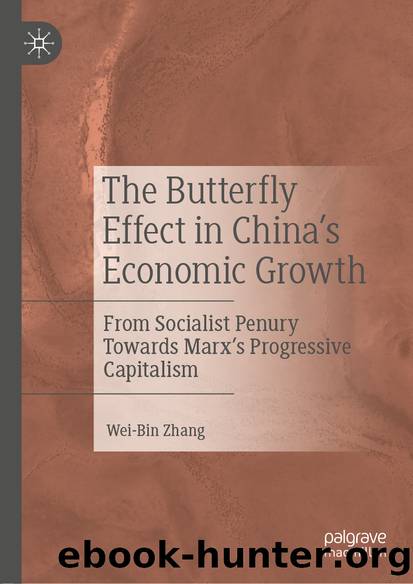The Butterfly Effect in Chinaâs Economic Growth by Wei-Bin Zhang

Author:Wei-Bin Zhang
Language: eng
Format: epub
ISBN: 9789811598890
Publisher: Springer Singapore
The Beneficiary of Global Knowledge Stock
When our thousands of Chinese students abroad return home, you will see how China will transform itself.
Deng Xiaoping
âMen make their own historyâ, Karl Marx (Dickson 1997: 1) writes in The Eighteenth Brumaire of Louis Bonaparte, âbut they do not make it just as they please. They do not make it under circumstances chosen by themselves, but under circumstances directly found, given and transmitted from the past.â Deng launched the economic reform from the condition left by Mao in the Confucian cultural soil. Chinese people began to accumulate wealth and knowledge with almost same conditions in terms of human capital and wealth among themselves with social order guaranteed by the party. It is a rare condition for market mechanisms to function so effectively.
No country, like China, has learned so much from the world in almost all fields only in the four decades. The world had created and accumulated huge knowledge and know-how stocks in mathematics, philosophy, history, believes, ideologies, ideas and thought, social sciences, natural sciences, technologies, literature, arts, sports, recipes, fashions, and the like by 1980. An important character of most of these stocks is âpurely publicâ in the sense that they are both non-exclusive and non-rivalrous. A typical industry is TV programs. Almost all once most popular TV programs, in US, UK, Japan, and the four little tigers appeared in Chinese TV channels with mainland Chinese language and Chinese styles reformed by learning and imitation (subject to the Chinese government surveillance). Theories by, for instance, Newton, Adam Smith, are learned freely by millions of Chinese people. Some ideas or methods which might be learned and freely applied to China are not strictly public. A recipe in Singapore may become popular in China. This kind of imitation might not cause much moral concerns but might make owners of some restaurants in Singapore lose consumers. Much of knowledge in the world is obtainable either freely or through purchasing books and articles. Some countries might be pleased to allow other countries to learn their cultural knowledge and methods. Millions of Chinese students have travelled and studied in many cultures since the onset of the economic reform. Certain knowledge is publicly inaccessible or very costly. Public media reported cases that Chinese companies stole foreign companiesâ techs. Picasso knows the art of artists: âGood artists copy, great artists steal.â In high techs, sciences, and mathematics, like in arts, boundaries between creativity, imitation, learning, and stealing need experts to judge. In intellectual worlds, only most talented know what are going on within the field. Mediocre and masses judge according to the media and their own emotion and bias.
The seed is a main determinant of a plant. The soil may become futile if the same seed is repeatedly farmed in the same place over generations. Max Weber observes: âIt is not true that good can only follow good and evil only from evil, but that often the opposite is true.â Traditional Confucian education systems turned out to be what Bertrand Russell says about education: âMen are born ignorant, not stupid.
Download
This site does not store any files on its server. We only index and link to content provided by other sites. Please contact the content providers to delete copyright contents if any and email us, we'll remove relevant links or contents immediately.
What's Done in Darkness by Kayla Perrin(25490)
Shot Through the Heart: DI Grace Fisher 2 by Isabelle Grey(18208)
Shot Through the Heart by Mercy Celeste(18151)
The Fifty Shades Trilogy & Grey by E L James(17767)
The 3rd Cycle of the Betrayed Series Collection: Extremely Controversial Historical Thrillers (Betrayed Series Boxed set) by McCray Carolyn(13179)
The Subtle Art of Not Giving a F*ck by Mark Manson(12896)
Scorched Earth by Nick Kyme(11821)
Stepbrother Stories 2 - 21 Taboo Story Collection (Brother Sister Stepbrother Stepsister Taboo Pseudo Incest Family Virgin Creampie Pregnant Forced Pregnancy Breeding) by Roxi Harding(11011)
Drei Generationen auf dem Jakobsweg by Stein Pia(10207)
Suna by Ziefle Pia(10176)
Scythe by Neal Shusterman(9249)
International Relations from the Global South; Worlds of Difference; First Edition by Arlene B. Tickner & Karen Smith(8599)
Successful Proposal Strategies for Small Businesses: Using Knowledge Management ot Win Govenment, Private Sector, and International Contracts 3rd Edition by Robert Frey(8404)
This is Going to Hurt by Adam Kay(7680)
Dirty Filthy Fix: A Fixed Trilogy Novella by Laurelin Paige(6444)
He Loves Me...KNOT by RC Boldt(5795)
How to Make Love to a Negro Without Getting Tired by Dany LaFerrière(5366)
Interdimensional Brothel by F4U(5298)
Thankful For Her by Alexa Riley(5148)
